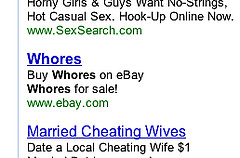 The Advertising Standards Authority (ASA) in the U.K. has decided that website publishers are responsible for all third-party ads that appear on their websites regardless of whether those ads are served based on content (such as Google AdSense).
The Advertising Standards Authority (ASA) in the U.K. has decided that website publishers are responsible for all third-party ads that appear on their websites regardless of whether those ads are served based on content (such as Google AdSense).
Both large and small companies serve a variety of third-party ads on their websites, with Google AdSense being the most popular. Have you ever visited a website and found inappropriate Google AdSense ads on that site? For example, imagine you visit a blog about infertility and an ad for baby clothes displays. That would be very inappropriate. Not convinced? Check out the picture in this post that shows actual Google AdSense ads displayed on a website courtesy of Flickr. Imagine how inappropriate those ads could be.
Since publishers typically have the opportunity to opt out of ads that would be inappropriate for their websites, the ASA has determined that the onous should fall on publishers to police their websites, remove inappropriate ads and modify advertising filters to ensure similar ads aren’t displayed in the future. What was once considered a passive revenue stream, has now taken on a new level of responsibility and must be actively maintained to block offensive ads.
The position of the ASA makes sense from the consumer perspective, but businesses are not happy. Actively managing a revenue stream that previously could be created then left alone to drive revenue with little intervention might now take additional headcount and investments to implement. The question is whether companies will listen to the ASA and actively police their third-party automated ads or if they’ll continue with business as usual with the hope that they won’t get caught.
Of course, there is no precedent in terms of the punitive or compensatory damages a company might face based on inappropriate third-party ads on their websites, but I’m sure no one wants to be the guinea pig and be the subject of the creation of that precedent.
What do you think? Will companies protect their brands by policing third party automated advertising that appears on their websites or turn a blind eye and hope for the best?
Image: Flickr
Susan Gunelius is the author of 10 marketing, social media, branding, copywriting, and technology books, and she is President & CEO of KeySplash Creative, Inc., a marketing communications company. She also owns Women on Business, an award-wining blog for business women. She is a featured columnist for Entrepreneur.com and Forbes.com, and her marketing-related articles have appeared on websites such as MSNBC.com, BusinessWeek.com, TodayShow.com, and more.
She has over 20 years of experience in the marketing field having spent the first decade of her career directing marketing programs for some of the largest companies in the world, including divisions of AT&T and HSBC. Today, her clients include large and small companies around the world and household brands like Citigroup, Cox Communications, Intuit, and more. Susan is frequently interviewed about marketing and branding by television, radio, print, and online media organizations, and she speaks about these topics at events around the world. You can connect with her on Twitter, Facebook, LinkedIn, or Google+.


